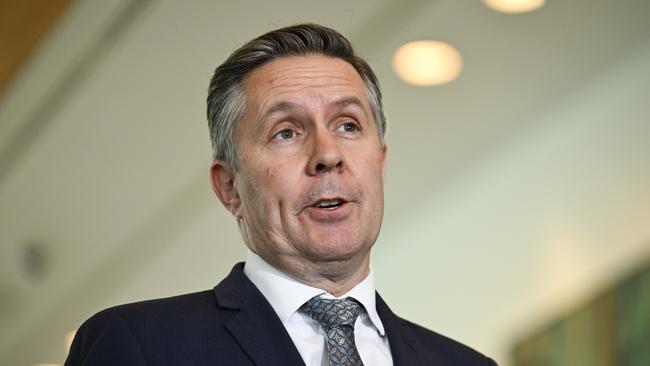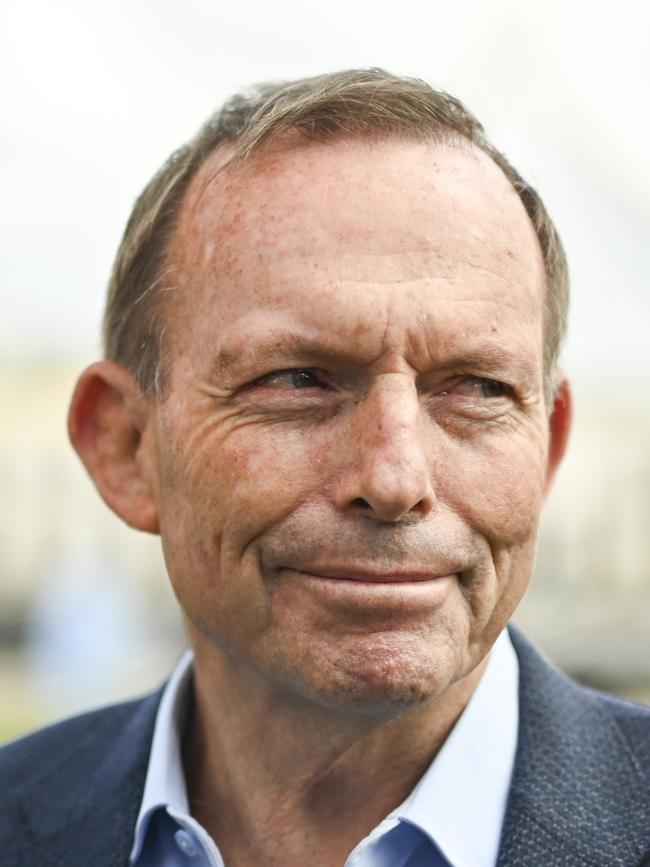Gender dysphoria under the microscope in federal review of puberty blocker prescription
Labor’s plan to take nearly two years to review transgender medicine for children and teens has been condemned as ‘just a device to avoid dealing with the issue’ as the new federal probe effectively halts any attempts by states to ban puberty blockers.

Labor’s plan to take nearly two years to review transgender medicine for children and teenagers has been condemned as “just a device to avoid dealing with the issue” as the new federal probe effectively halts any attempts by states to ban puberty blockers.
Health Minister Mark Butler’s move late on Friday to launch a review into gender therapies and delay the banning of hormone therapies in Queensland was largely welcomed by LGBTI groups and the Greens, who have been railing against growing restrictions on puberty blockers around the world.
But critics of gender-affirming medical treatment for children – including former prime minister Tony Abbott and medical whistleblower Jillian Spencer – said the government’s decision to wait until mid-next year to deliver “interim advice” on the use of puberty blockers was not acceptable.
Questions are also being asked on who would sit on Labor’s gender medicine review panel, with the government saying people with lived experience would co-lead the probe and not making clear whether those known for harbouring concerns over puberty blockers would be involved. Mr Butler said it had been six years since clinical guidelines had been set for trans and gender diverse children, which he pointed out had never been approved by the National Health and Medical Research Council.
He also said that while public gender services to young people was exclusively led by states and territories, the NHMRC was the nation’s leading group for health and medical research and was “the right body to do this work”.
“Governments also have a clear responsibility to ensure Australians are receiving the best medical advice and care available,” he said. “That responsibility is especially important when it comes to the care of highly vulnerable children and adolescents.”

But Dr Spencer – a child psychiatrist whose suspension from the Queensland Children’s Hospital over her approach to trans patients partly sparked the state LNP’s moves this week – questioned the time frame of the federal review and said she was concerned the Albanese government could impinge on its independence.
“I don’t know if I can trust the Labor government to establish an inquiry that is independent and is going to truly be based on the research literature,” she said.
“It’s had this building body of evidence showing that we don’t have enough evidence for these interventions in children, but it’s consistently been ignored. Then now we find out that they’re going to take another 18 months to look at what we already know. It should be a national approach, because the health and welfare of children with gender distress is too important to just leave to a higgledy-piggledy system of state governments, but the main thing is that it has to be truly independent and evidence based.”
Mr Abbott – who led calls for a national inquiry into gender medicine this week – also said the report would take too long.
“Given that Butler states ‘interim advice on the use of puberty blockers will be completed in the middle 2026’ his is just a device to avoid dealing with the issue,” the ex-Liberal prime minister said. “Why should minors who can’t legally buy cigarettes or alcohol, vote or drive a car be allowed to demand irreversible chemical or surgical treatment that they might one day deeply regret?”
In a swipe at Labor’s intervention, opposition health spokeswoman Anne Ruston said it was “important to note that the operation of gender dysphoria clinics across Australia (was) a matter for state and territory governments”. “We commend the leadership shown by the Queensland LNP government and the Western Australian opposition in these matters,” she said.

Following the decision from British Labour to ban puberty blockers in December and Donald Trump indicating he would restrict gender care for under 19-year-olds, the Queensland government revealed on Tuesday it would temporarily pause access to hormone therapies for new patients under the age of 18 while conducting a broad review into the matter across the state
It came after reviews launched specifically into the Cairns Sexual Health Service.
But Mr Butler said he had cautioned the Queensland government against making any moves on its own and instead leave the issue to the NHMRC.
“I’ve spoken, among others, to the Queensland Health Minister, Tim Nicholls … and I’ve indicated to Minister Nicholls that I don’t think it would be appropriate for Queensland to continue with their stated intention to undertake an evidence review in this area of care,” he said. “These issues should be nationally consistent, and in my view, should be driven by the pre-eminent authority, which is the NHMRC.”
While the dual Cairns reviews will continue, the future of the third broader review of medical evidence – and temporary banning of puberty blockers – is uncertain. When contacted for comment on the commonwealth’s intervention, a Queensland government spokeswoman said “the safety of children had always been the focus”.

A spokesman for NSW Health Minister Ryan Park said the state’s 2024 evidence review by the Sax Institute found puberty suppression, gender-affirming hormones and psychological therapies could be beneficial for young people who are trans and gender diverse. “We welcome the development of national guidelines by the Australian Government’s primary health and medical research funding agency,” the spokesman said.
On Wednesday more than 100 prominent Australians, including doctors of the field, accused Australian politicians and the medical community of ignoring and of even undermining the findings of international reviews.
Clinical psychiatrist Ian Hickie, an eminent leader in youth mental health and gender diverse standards of care at the University of Sydney’s Brain and Mind Centre, said the “high credibility and independence” of the NHMRC could put debate to rest and extract politics from medical decisions.
“It’s a really difficult area in terms of the continuous evaluation of the international evidence worldwide, and this is why it’s been so controversial,” Professor Hickie said.
“People are having to make decisions and work with the best available evidence while at the same time continuing to collect evidence about the long-term mental health and physical health outcomes.”
He argued the occupations who would be at the coalface of future care – namely physicians, paediatricians and psychiatrists – should be represented in the review alongside subject matter experts who could elevate Australia to a world-leader in standards of care.
The Royal Australian and New Zealand College of Psychiatrists was the first national health body to oppose the prescription of puberty blockers. It was contacted for comment, but had not responded by time of writing.
“The thing has been so politicised in the United Kingdom and elsewhere, obviously in the United States you see this further under the Trump administration, the politics of it has overtaken the clinical common sense and where the evidence is actually at,” Professor Hickie said.
“We can walk and chew gum, frankly. We can continue to provide best practice, but we can also review the evidence and set up longitudinal studies.”
The Australian Professional Association for Trans Health, whose advocacy was cited in Mr Butler’s announcement, urged a thorough and inclusive consultative process, while the Greens “cautiously welcomed” the move by Labor.
Additional reporting: Mackenzie Scott




To join the conversation, please log in. Don't have an account? Register
Join the conversation, you are commenting as Logout